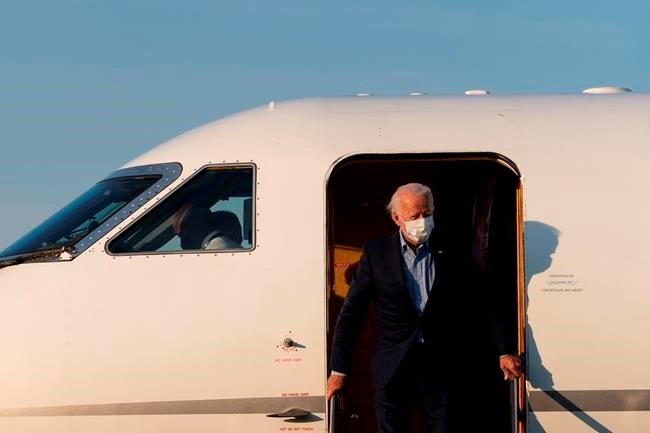WASHINGTON — Joe Biden ventured into America's hard-hit manufacturing heartland Wednesday, promising a suite of Buy American tax credits and penalties to fortify his blue-collar bona fides and pry working-class votes away from Donald Trump — measures sure to conjure sweaty palms in Canada.
During a visit to the Detroit suburb of Warren, Mich., the cradle of the U.S. auto industry and the buckle of the Rust Belt, Biden hammered away at his Republican rival's "America First" credentials in a battleground state the sitting president won by a scant 11,000 votes in 2016.
If elected, Biden said, he would impose stiff new tax penalties on companies that manufacture U.S.-bound products outside the country, create incentives for keeping jobs on U.S. soil and close what he called "Trump loopholes" that allow companies engaged in offshoring to avoid paying U.S. taxes.
He's also promising executive orders to more strictly enforce and "expand and tighten" Buy American provisions, make U.S. products more competitive, expand the list of "critical materials" that must be American-made and establish a "Made in America" office within the White House.
"We can revitalize our industrial base as the heart of the American middle class," Biden said, standing before a display of U.S.-built cars and trucks.
"I don't accept the defeatist view that the forces of automation and globalization mean we can't keep good-paying union jobs here in America and create more of them. I don't buy for one second that the vitality of American manufacturing is a thing of the past."
Canada is no stranger to Buy American heartburn.
As Barack Obama's vice-president, Biden presided over the implementation of the 2009 Recovery Act, an $800-billion stimulus package enacted in the midst of the Great Recession that restricted the use of foreign materials and international bids on U.S. infrastructure projects — rules from which it took Canada nearly a year to negotiate a waiver.
"It's not going to be any walk in the park," said Eric Miller, a Canada-U.S. expert and president of the D.C.-based Rideau Potomac Strategy Group. "Canada is going to have to have its elbows up and fight just as hard in the corners with a Biden administration."
After nearly four years of tumultuous Trump rule, it's not unreasonable for Canadians to assume a Democrat in the White House would be better for the cross-border relationship — and many do, a new poll suggests.
Two-thirds of the 1,529 Canadian respondents to the online poll, conducted by Leger and the Association for Canadian Studies, said Canada-U.S. ties would improve under Biden. A similar percentage — 69 per cent — said relations will worsen if Trump is re-elected.
Given the political climate in the U.S., it's hardly surprising that the Democrats are using protectionist rhetoric to appeal to the same working-class voters who helped send Trump to Washington in the first place, Miller added.
"To some extent, there's going to be frictions and complexities regardless of who wins. It's just that the frictions and complexities under Trump will be different than the frictions and complexities under Biden."
The new "Made in America" office would have the power to review all Buy American waivers and establish a public record of any and all of them, Biden added, "to make sure we enforce Buy American and direct the full purchasing power of the federal government to fulfil its promise, starting by closing those waiver loopholes immediately."
There was significant economic anxiety and anger in 2009 in the U.S., which was in the throes of an economic meltdown at the time — American property values had plummeted and Washington was bailing out Wall Street, said Gary Doer, who was Canada's ambassador to the U.S. when the Recovery Act was introduced.
"There was a lot of pitchforks, metaphorically speaking," Doer recalled of the public mood — and both Congress and the White House were under pressure to ensure that the administration's big-ticket spending plans would primarily benefit Americans.
Eleven years later, in the throes of the COVID-19 pandemic, the "Buy American" battle cry may be more about politics than policy, Doer suggested: "It's a good bumper sticker."
Canada does have an advantage, he added: strong organized-labour ties between manufacturing unions and their members on either side of the Canada-U.S. border, a relationship that proved vital during the 2009 talks.
"It's not something (Biden) will acknowledge during a very tight campaign, but he has a very close relationship with the hardhats right now," Doer said.
"The private-sector unions have members on both sides of the border, they have the duty of representation for their members on both sides of the border, and they were the reason why we were the only country to get a waiver."
Canada's Chamber of Commerce will wait for the election dust to settle in the U.S. before drafting a strategy, said Mark Agnew, the chamber's senior director of international policy.
"I think a lot of the rhetoric that Joe Biden would employ as president would certainly be different, and I think there hopefully would be a more collaborative approach to working with Canada," Agnew said.
"But I don't think we should be under any illusion that Joe Biden is, you know, a neo-liberal economic president. There's still going to be a fairly hardline edge to it. The name 'Made in America' I think speaks for itself in many respects."
This report by The Canadian Press was first published Sept. 9, 2020.
— Follow James McCarten on Twitter @CdnPressStyle
James McCarten, The Canadian Press



